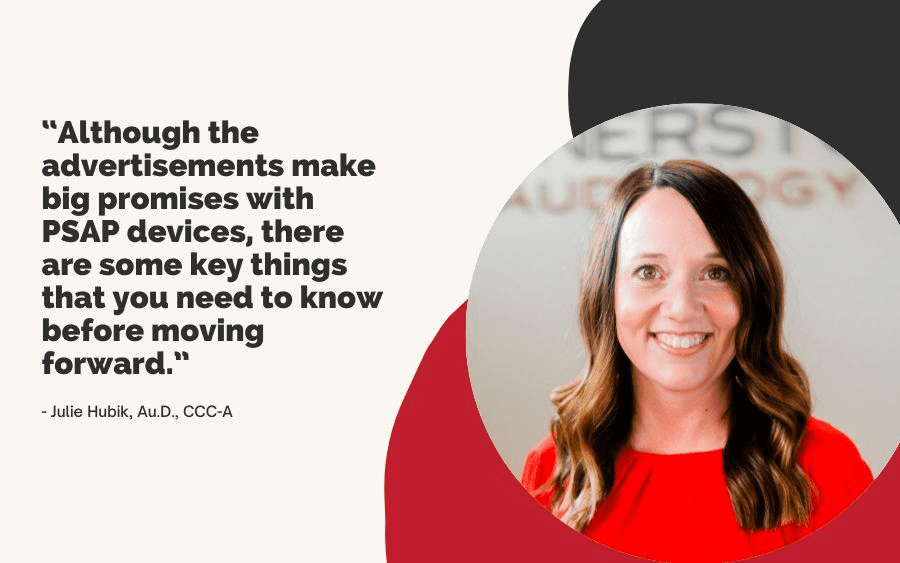There has recently been a surge in Google searches of people asking questions about ‘non-prescription hearing aids’.
It is a term that has never previously been used in the hearing care industry, and I felt compelled to share my thoughts and advice as a Doctor of Audiology.
What are ‘Non-Prescription Hearing Aids?’
Although there is no definitive definition, non-prescription hearing aids are hearing devices that do not require you to have your hearing tested or visit a hearing professional before self-fitting them.
Better known as ‘PSAP’s (Personal Sound Amplification Product) – these are basic devices that you can insert into your ears in order to amplify sounds.
These devices have been around for many years, and are the low-cost devices that you see in newspaper advertisements promising better hearing without visiting a hearing professional.
What is the Problem with ‘Non-Prescription Hearing Aids’?
Although the advertisements make big promises with PSAP devices, there are some key things that you need to know before moving forward.
#1 – They Amplify Sounds that Do Not Need Amplifying [The Risks]
Amplifiers turn up the volume across all frequencies the same amount, just like a volume control of a television. This is often counter-productive as although patients with hearing loss need more volume, they don’t necessarily need more volume EVERYWHERE. Amplifying everything simply causes more frustration because now everything is just loud, not clear.
Hearing loss is extremely individual, sort of like a fingerprint. Each frequency tested needs a different amount of gain to achieve a more normal hearing range for the patient. This is why a hearing evaluation plays a key role in understanding what tones you can hear and which you cannot. A hearing test is essentially a prescription for hearing aids. It’s a roadmap for programming devices to increase volume at a precise amount through fitting formulas to improve understanding of conversation without turning everything up.
If you just make everything louder, you run very big risks of causing further damage to your hearing by exposing yourself to loud sounds that do not need amplification.
#2 – They May Not be What You Need
Buying ‘non-prescription hearing aids’ is the equivalent of self-prescribing medication without visiting a physician.
We often have patients visit us that believe that they only have a mild hearing loss. When we test them, we realize just how severe their hearing loss is. The biggest challenge with hearing loss is that it’s often slow and gradual with no noticeable day-to-day differences. This makes it very difficult to self-diagnose, and it’s why our loved ones often notice that we’re struggling to hear before we accept it.
You may believe that you have a mild hearing loss and some amplifiers are all you need to hear in certain situations, but unless you’ve had your hearing professionally tested, then you may be making a poor long-term decision that will result in further complications in the long run.
#3 – They’re a Short-Term Solution
We’ve had many people walk through our doors that invested in PSAP’s (amplifiers) as they believed this was the first step to hearing speech better in background noise. This is actually a terrible solution, as we discussed, because PSAPs make even the background noise louder, causing more problems than the patient experienced without the device.
This often results in PSAP’s being somewhat of a gateway drug towards realizing that they need prescription hearing aids but having wasted money on their PSAP with no return/refund policy.
My Recommendation to You
My professional recommendation to you is to have your hearing professionally tested as your first action.
You may discover that your hearing challenges are a result of something simple like a build-up of earwax, or you may discover that your hearing loss is worse than you thought and it needs professional help.
Regardless, ensuring you’re being assessed by a professional will guarantee that you make the best possible decisions for your long-term hearing health.
If you have any questions or need any guidance, then please do not hesitate in contacting us.
With so many myths and misconceptions around healthy hearing, we’re incredibly passionate about raising awareness of the importance of best practices and ensuring that more people make the best possible decisions on their journey to better hearing.





